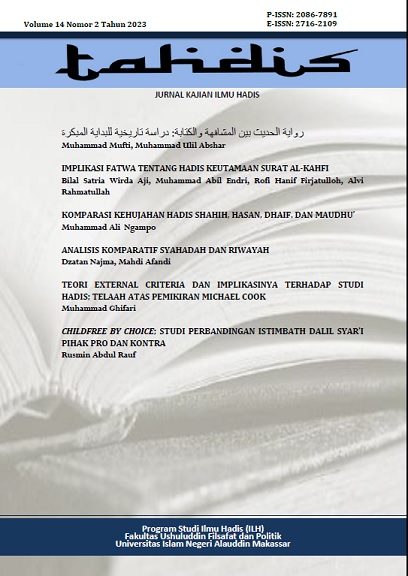Analisis Komparatif Syahadah dan Riwayah
Abstract
Hadith is the second primary source after the Koran, some even position it on a par with the Koran. In the study of hadith there are many things that can be studied, one of which is the study of history. This method of transmission which is only owned by Muslims makes Islamic scholarship maintain its authenticity by using the standards of narrators that must be 'fair and ḍabit. Among the scholars of hadith there is also something called the shahadah or testimony which is often compared to riwayah. In this article the author will try to compare the shahadah and narrations using the descriptive-analytic method with the aim of knowing the similarities and differences between the two. The results of this study indicate that the shahadah and riwayah are both conveying information with the aim of establishing something that requires the perpetrators to be Muslim, mukallaf, just and ḍabit. While the difference is that the shahadah must be an independent person, not blind, the number is determined, there is no kinship and it must be submitted to uphold the truth. While the narrations do not question this and are more general in nature, they may be slaves, blind, regardless of gender, do not question kinship relations, not on specific matters, but these narrations are more prophetic in nature.
Authors who publish with this journal agree to the following terms:
(1) Authors retain copyright and grant the journal right of first publication with the work simultaneously licensed under a Creative Commons Attribution License that allows others to share the work with an acknowledgment of the work's authorship and initial publication in this journal.
(2) Authors are able to enter into separate, additional contractual arrangements for the non-exclusive distribution of the journal's published version of the work (e.g., post it to an institutional repository or publish it in a book), with an acknowledgment of its initial publication in this journal.
(3) Authors should sign copyright transfer agreement when they have approved the final proofs sent by Biogenesis prior the publication.







